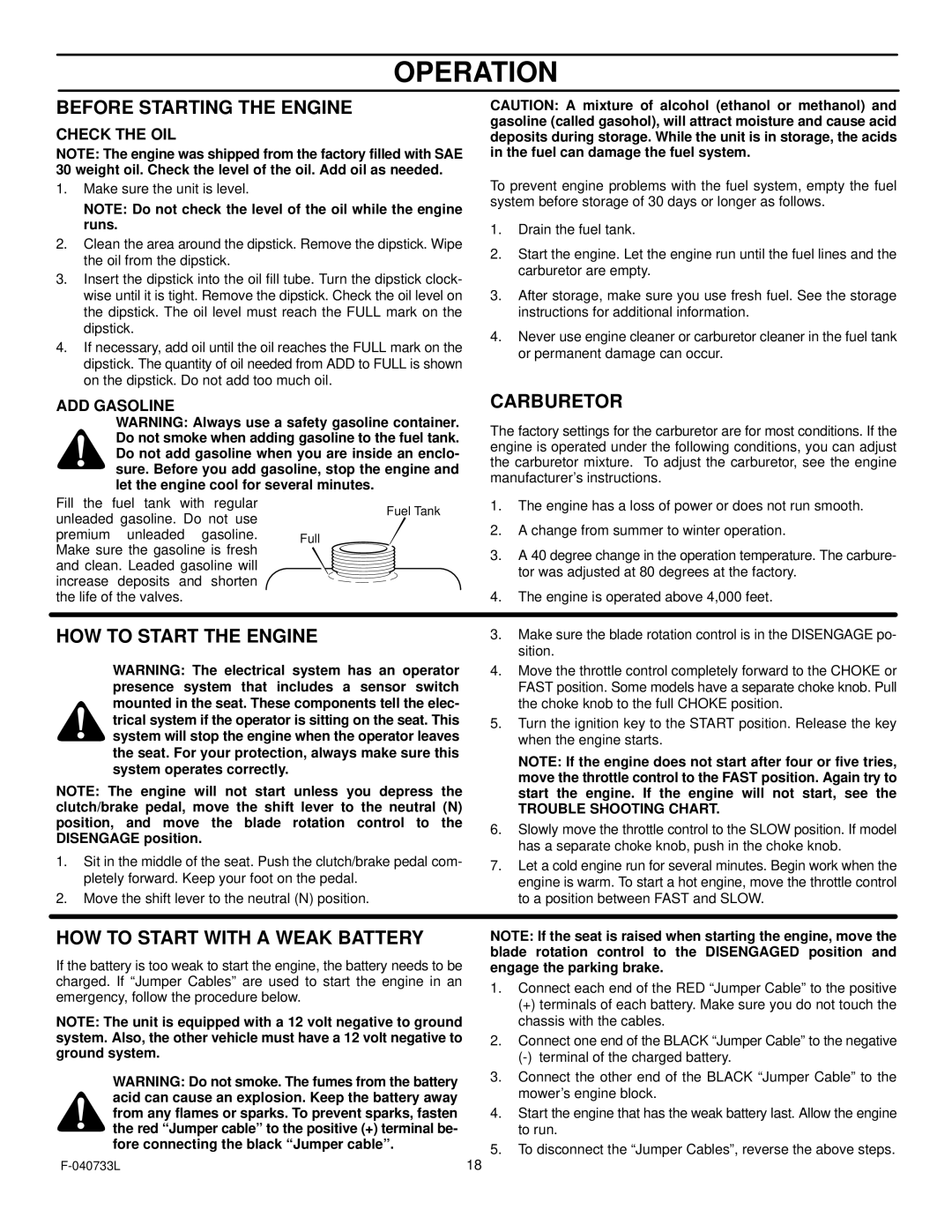
OPERATION
BEFORE STARTING THE ENGINE
CHECK THE OIL
NOTE: The engine was shipped from the factory filled with SAE 30 weight oil. Check the level of the oil. Add oil as needed.
1.Make sure the unit is level.
NOTE: Do not check the level of the oil while the engine runs.
2.Clean the area around the dipstick. Remove the dipstick. Wipe the oil from the dipstick.
3.Insert the dipstick into the oil fill tube. Turn the dipstick clock- wise until it is tight. Remove the dipstick. Check the oil level on the dipstick. The oil level must reach the FULL mark on the dipstick.
4.If necessary, add oil until the oil reaches the FULL mark on the dipstick. The quantity of oil needed from ADD to FULL is shown on the dipstick. Do not add too much oil.
CAUTION: A mixture of alcohol (ethanol or methanol) and gasoline (called gasohol), will attract moisture and cause acid deposits during storage. While the unit is in storage, the acids in the fuel can damage the fuel system.
To prevent engine problems with the fuel system, empty the fuel system before storage of 30 days or longer as follows.
1.Drain the fuel tank.
2.Start the engine. Let the engine run until the fuel lines and the carburetor are empty.
3.After storage, make sure you use fresh fuel. See the storage instructions for additional information.
4.Never use engine cleaner or carburetor cleaner in the fuel tank or permanent damage can occur.
ADD GASOLINE
WARNING: Always use a safety gasoline container. Do not smoke when adding gasoline to the fuel tank. Do not add gasoline when you are inside an enclo- sure. Before you add gasoline, stop the engine and let the engine cool for several minutes.
CARBURETOR
The factory settings for the carburetor are for most conditions. If the engine is operated under the following conditions, you can adjust the carburetor mixture. To adjust the carburetor, see the engine manufacturer’s instructions.
Fill the | fuel tank with regular |
| Fuel Tank | 1. | The engine has a loss of power or does not run smooth. |
unleaded gasoline. Do not use |
|
|
| ||
|
| 2. | A change from summer to winter operation. | ||
premium | unleaded gasoline. | Full |
| ||
Make sure the gasoline is fresh |
|
| 3. | A 40 degree change in the operation temperature. The carbure- | |
and clean. Leaded gasoline will |
|
| |||
|
|
| tor was adjusted at 80 degrees at the factory. | ||
increase | deposits and shorten |
|
|
| |
|
| 4. | The engine is operated above 4,000 feet. | ||
the life of the valves. |
|
| |||
HOW TO START THE ENGINE
3.Make sure the blade rotation control is in the DISENGAGE po- sition.
WARNING: The electrical system has an operator presence system that includes a sensor switch mounted in the seat. These components tell the elec- trical system if the operator is sitting on the seat. This system will stop the engine when the operator leaves the seat. For your protection, always make sure this system operates correctly.
NOTE: The engine will not start unless you depress the clutch/brake pedal, move the shift lever to the neutral (N) position, and move the blade rotation control to the DISENGAGE position.
1.Sit in the middle of the seat. Push the clutch/brake pedal com- pletely forward. Keep your foot on the pedal.
2.Move the shift lever to the neutral (N) position.
4.Move the throttle control completely forward to the CHOKE or FAST position. Some models have a separate choke knob. Pull the choke knob to the full CHOKE position.
5.Turn the ignition key to the START position. Release the key when the engine starts.
NOTE: If the engine does not start after four or five tries, move the throttle control to the FAST position. Again try to start the engine. If the engine will not start, see the
TROUBLE SHOOTING CHART.
6.Slowly move the throttle control to the SLOW position. If model has a separate choke knob, push in the choke knob.
7.Let a cold engine run for several minutes. Begin work when the engine is warm. To start a hot engine, move the throttle control to a position between FAST and SLOW.
HOW TO START WITH A WEAK BATTERY
If the battery is too weak to start the engine, the battery needs to be charged. If “Jumper Cables” are used to start the engine in an emergency, follow the procedure below.
NOTE: The unit is equipped with a 12 volt negative to ground system. Also, the other vehicle must have a 12 volt negative to ground system.
WARNING: Do not smoke. The fumes from the battery acid can cause an explosion. Keep the battery away from any flames or sparks. To prevent sparks, fasten the red “Jumper cable” to the positive (+) terminal be- fore connecting the black “Jumper cable”.
NOTE: If the seat is raised when starting the engine, move the blade rotation control to the DISENGAGED position and engage the parking brake.
1.Connect each end of the RED “Jumper Cable” to the positive
(+) terminals of each battery. Make sure you do not touch the chassis with the cables.
2.Connect one end of the BLACK “Jumper Cable” to the negative
3.Connect the other end of the BLACK “Jumper Cable” to the mower’s engine block.
4.Start the engine that has the weak battery last. Allow the engine to run.
5.To disconnect the “Jumper Cables”, reverse the above steps.
18 |
